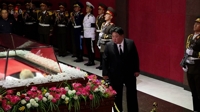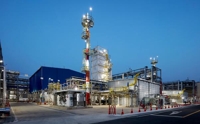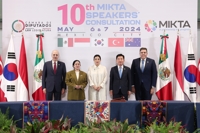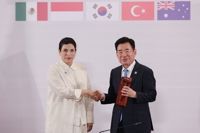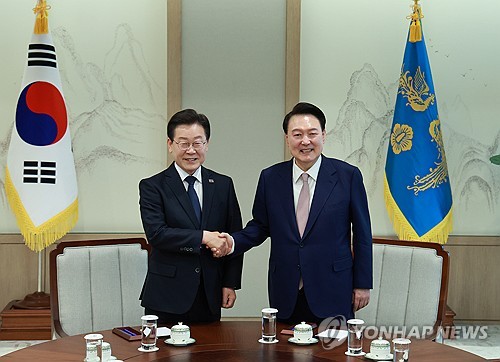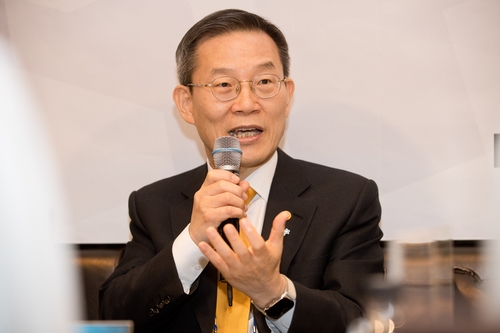(LEAD) Ruling party wins landslide victory in parliamentary by-elections
(LEAD) by-elections-results
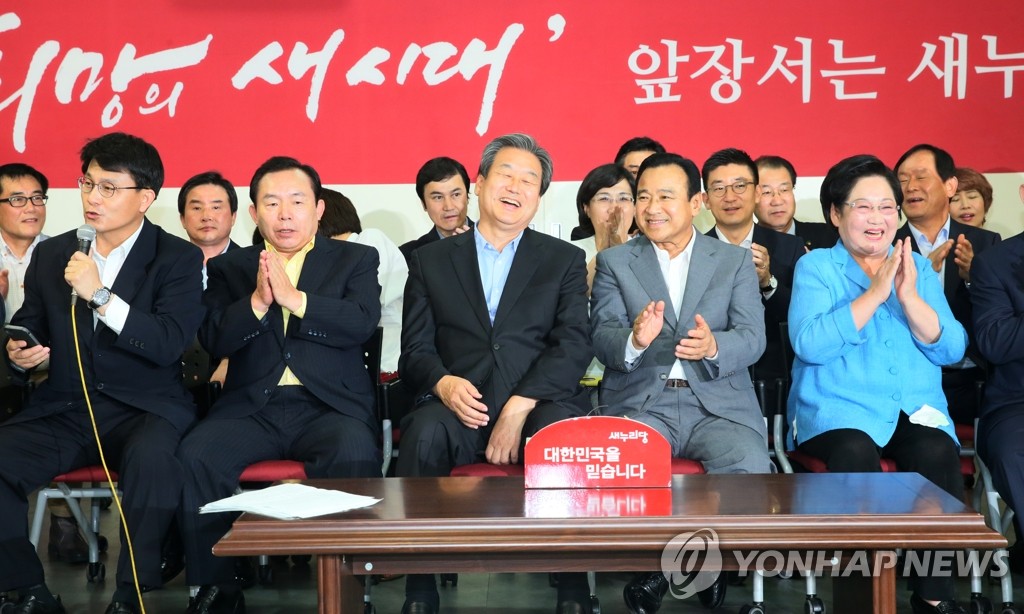
Rep. Kim Moo-sung (C), the head of the ruling Saenuri Party, celebrates his party's victory in the by-elections at the party headquarters in Seoul on July 30, 2014. The ruling party secured victories in 11 of the 15 constituencies up for grabs, leaving the main opposition New Politics Alliance for Democracy (NPAD) with the remaining four seats. The elections raised the number of seats belonging to the ruling party to 158. NPAD now has 130 seats in the 300-member National Assembly. (Yonhap)
(END)
(LEAD) Ruling party wins landslide victory in parliamentary by-elections
(ATTN: UPDATES throughout with election results, background, quotes; CHANGES headline)
SEOUL, July 31 (Yonhap) -- South Korea's ruling party won a landslide victory in Wednesday's parliamentary by-elections in a boost to President Park Geun-hye's conservative administration and a blow to the liberal opposition camp.
The polls, seen as a midterm referendum on the Park government, had widely been expected to be a tight race between the ruling Saenuri Party and the main opposition New Politics Alliance for Democracy (NPAD) due to uncertainties about voter sentiment following April's deadly ferry sinking, among other variables.
However, ruling party candidates secured victories in 11 of the 15 constituencies up for grabs, leaving NPAD with the remaining four seats, according to the National Election Commission (NEC). The elections raised the number of seats belonging to the ruling party to 158. NPAD now has 130 seats in the 300-member National Assembly.
The polls carried extra weight because 15 parliamentary seats were being contested, the most ever for a by-election. They also came less than two months after the June 4 local elections in which neither the ruling nor the main opposition party claimed a clear-cut victory.
Voting closed at 8 p.m. at 1,003 polling stations in 15 constituencies nationwide, including Seoul's Dongjak-B district and three crucial districts in Suwon, just south of the capital.
Seoul and Suwon were especially closely watched due to the large number of political heavyweights involved and the opposition bloc's mergers of candidacies aimed at boosting its chances of victory.
Na Kyung-won of the ruling party beat Roh Hoe-chan of the minor opposition Justice Party in Dongjak-B even after Gi Dong-min of the NPAD withdrew from the race last week to support Roh.
In Suwon, the ruling party won districts B and C, while the opposition party claimed district D.
Kim Yong-nam's victory in district C is seen as having dealt a blow to NPAD's Sohn Hak-kyu, a former opposition leader reported to have presidential aspirations.
In South Jeolla Province, a traditional stronghold of the liberal camp, the ruling party's Lee Jung-hyun beat NPAD's Suh Gab-won in the constituency of Suncheon and Gokseong.
It is the first time since 1988 that the ruling party has won a seat in South Jeolla, a reflection of the deep regionalism that has been characteristic of South Korean politics.
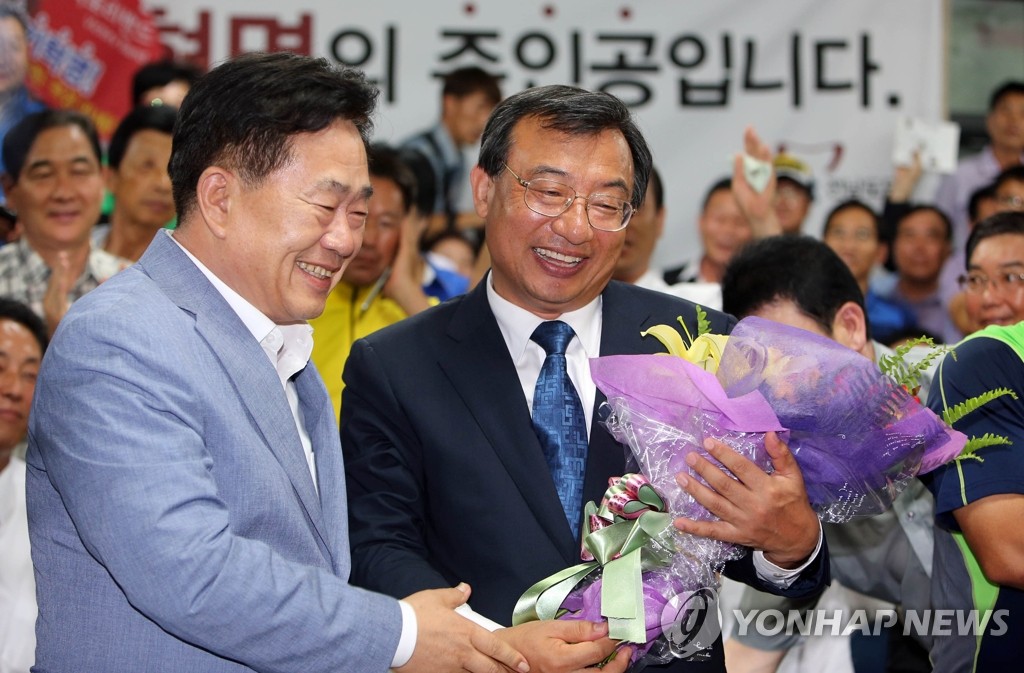
Lee Jung-hyun (R), a close confidant of President Park Geun-hye, rejoices at his office in Suncheon, South Jeolla Province, on July 30, 2014, after beating Suh Gab-won of the major opposition New Politics Alliance for Democracy in the constituency of Suncheon and Gokseong in the by-elections held on the day. It is the first time since 1988 that the conservative ruling party has won a seat in South Jeolla Province, a traditional stronghold of the liberal opposition camp. (Yonhap)
(END)
The two candidates also drew attention because they were seen as representing two different presidents at opposite ends of the political spectrum. Lee served as a senior secretary to President Park, while Suh served as a secretary to the late former liberal president, Roh Moo-hyun.
The winners from the opposition party include Kwon Eun-hee, a former chief investigator who accused her boss of trying to whitewash the results of a police investigation into allegations the national spy agency meddled in the 2012 presidential race to sway public opinion in favor of then-ruling party candidate and now President Park.
NPAD's nomination of Kwon for a district in Gwangju, South Jeolla, drew fierce criticism from the ruling party, which accused the police official of perjury.
The victory of NPAD's Park Kwang-on in Suwon-D could have considerable repercussions for the ruling party's candidate, Yim Tae-hee, as the former labor minister has been reported to have presidential ambitions. Yim also served as chief of staff to former President Lee Myung-bak.
During the campaign, the ruling party called on voters to help it reclaim an absolute majority in the National Assembly so that it can realize President Park's pledge to reform the nation and revive the economy.
The opposition party, meanwhile, had called on voters to pass judgment on the Park administration for failing to properly respond to the April 16 ferry disaster, which claimed the lives of more than 300 people, mostly high school students.
The ruling party's upset victory is seen as an indication of public fatigue with the opposition's calls, as well as public anger over the opposition party's "strategic nomination" of candidates, which bypassed the party primary process.
The election results are also expected to help the government rebuild itself in the wake of the ferry disaster and pursue its stated goal of economic revival.
"We promise to put all of our efforts into making the public's lives more comfortable through the success of the Park Geun-hye government's drive to revitalize the livelihoods of the public," Kim Moo-sung, the chief of the ruling party, said at his party's headquarters in Seoul.
Yoo Ki-hong, a spokesman of NPAD, said his party accepts the public's will "heavily and humbly."
"The elections will become a foundation for us to keep the government and the ruling party properly in check, and we will step up efforts to stand on the side of the people," he said.
Voter turnout came in at 32.9 pct, lower than the average of 35.3 percent recorded for the 14 previous parliamentary by-elections since 2000, according to the NEC.
hague@yna.co.kr
(END)
-
 BTS' RM to prerelease 'Come Back to Me,' music video directed by Lee Jung-jin of 'Beef'
BTS' RM to prerelease 'Come Back to Me,' music video directed by Lee Jung-jin of 'Beef' -
 Disney+ 'Uncle Samsik' aims to provoke thought with ambitious characters in turbulent times
Disney+ 'Uncle Samsik' aims to provoke thought with ambitious characters in turbulent times -
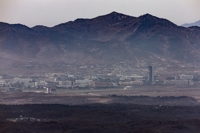 N. Korea dismantles S. Korean building near shuttered Kaesong complex
N. Korea dismantles S. Korean building near shuttered Kaesong complex -
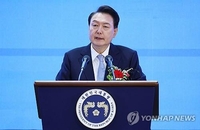 Yoon pledges to increase monthly senior basic pension benefit
Yoon pledges to increase monthly senior basic pension benefit -
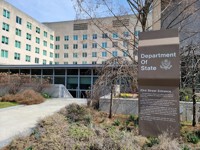 (Yonhap Interview) U.S. will do 'all' it can to back S. Korea in case of China's economic coercion: official
(Yonhap Interview) U.S. will do 'all' it can to back S. Korea in case of China's economic coercion: official
-
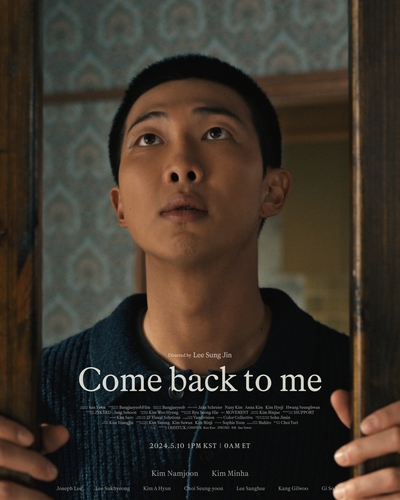 BTS' RM to prerelease 'Come Back to Me,' music video directed by Lee Jung-jin of 'Beef'
BTS' RM to prerelease 'Come Back to Me,' music video directed by Lee Jung-jin of 'Beef' -
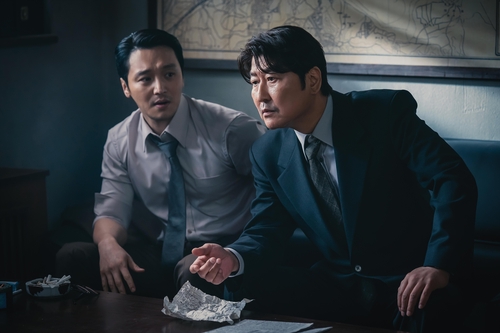 Disney+ 'Uncle Samsik' aims to provoke thought with ambitious characters in turbulent times
Disney+ 'Uncle Samsik' aims to provoke thought with ambitious characters in turbulent times -
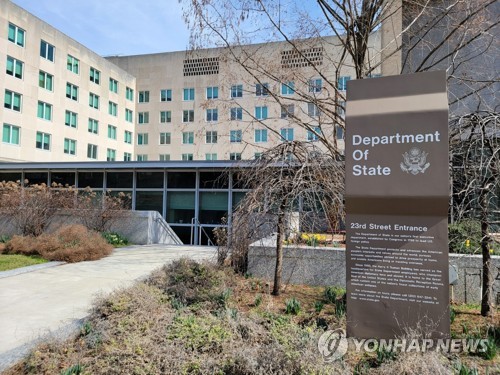 (Yonhap Interview) U.S. will do 'all' it can to back S. Korea in case of China's economic coercion: official
(Yonhap Interview) U.S. will do 'all' it can to back S. Korea in case of China's economic coercion: official -
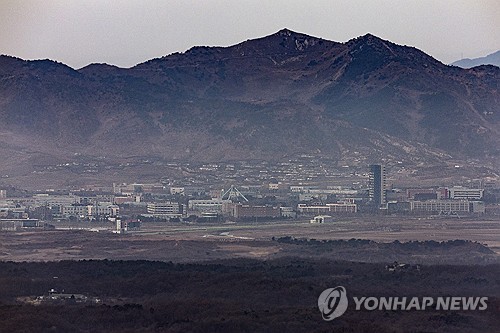 N. Korea dismantles S. Korean building near shuttered Kaesong complex
N. Korea dismantles S. Korean building near shuttered Kaesong complex -
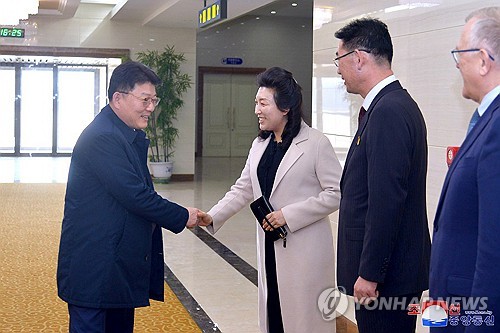 N. Korean economic delegation returns from Iran amid suspected military ties
N. Korean economic delegation returns from Iran amid suspected military ties
-
 BTS' RM to prerelease 'Come Back to Me,' music video directed by Lee Jung-jin of 'Beef'
BTS' RM to prerelease 'Come Back to Me,' music video directed by Lee Jung-jin of 'Beef' -
 (Yonhap Interview) Ex-Pentagon official stresses need for war plan rethink, swift OPCON transfer, USFK overhaul
(Yonhap Interview) Ex-Pentagon official stresses need for war plan rethink, swift OPCON transfer, USFK overhaul -
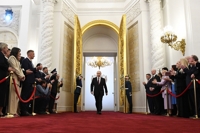 Top S. Korean envoy to Russia attends Putin's inauguration ceremony: Seoul official
Top S. Korean envoy to Russia attends Putin's inauguration ceremony: Seoul official -
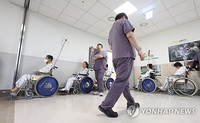 Foreign medical license holders to practice medicine in S. Korea amid prolonged doctors' walkout
Foreign medical license holders to practice medicine in S. Korea amid prolonged doctors' walkout -
 KF-21 fighter jet prototype to conduct 1st Meteor missile test
KF-21 fighter jet prototype to conduct 1st Meteor missile test














